- Home
- Una LaMarche
Five Summers
Five Summers Read online
FIVE
SUMMERS
UNA LaMARCHE
An Imprint of Penguin Group (USA) Inc.
Published by the Penguin Group
Penguin Group (USA) Inc., 375 Hudson Street, New York, New York 10014, USA
Penguin Group (Canada), 90 Eglinton Avenue East, Suite 700,
Toronto, Ontario M4P 2Y3, Canada (a division of Pearson Penguin Canada Inc.) Penguin Books Ltd, 80 Strand, London WC2R 0RL, England
Penguin Ireland, 25 St Stephen’s Green, Dublin 2, Ireland (a division of Penguin Books Ltd)
Penguin Group (Australia), 707 Collins Street, Melbourne, Victoria 3008, Australia (a division of Pearson Australia Group Pty Ltd)
Penguin Books India Pvt Ltd, 11 Community Centre, Panchsheel Park, New Delhi–110 017, India
Penguin Group (NZ), 67 Apollo Drive, Rosedale, Auckland 0632, New Zealand (a division of Pearson New Zealand Ltd)
Penguin Books (South Africa), Rosebank Office Park, 181 Jan Smuts Avenue, Parktown North 2193, South Africa
Penguin China, B7 Jiaming Center, 27 East Third Ring Road North, Chaoyang District, Beijing 100020, China
Penguin Books Ltd, Registered Offices: 80 Strand, London WC2R 0RL, England
Copyright © 2013 Penguin Group (USA) Inc.
All rights reserved. No part of this book may be reproduced, scanned, or distributed in any printed or electronic form without permission. Please do not participate in or encourage piracy of copyrighted materials in violation of the author’s rights. Purchase only authorized editions.
Published simultaneously in Canada
Library of Congress Cataloging-in-Publication Data is available
ISBN: 978-1-101-60677-3
This is a work of fiction. Names, characters, places, and incidents either are the product of the author’s imagination or are used fictitiously, and any resemblance to actual persons, living or dead, businesses, companies, events, or locales is entirely coincidental.
For UTAH.
(The girls, not the state.)
Contents
Title Page
Copyright
Title Page
Prologue
Emma
Skylar
Emma
Jo
Maddie
Emma
Maddie
Maddie
Jo
Emma
Skylar
Emma
Emma
Maddie
Jo
Emma
Emma
Skylar
Emma
Skylar
Maddie
Skylar
Emma
Maddie
Jo
Emma
Jo
Jo
Emma
Emma
Jo
Emma
Emma
Jo
Emma
Jo
Skylar
Skylar
Jo
Maddie
Emma
Emma
Skylar
Emma
Acknowledgments
Prologue from
Emma
in their Fifth Summer when the girls are Age 14
During the Last Night of Camp
THERE ARE SOME THINGS THAT SEEM LIKE THEY’LL just never happen. There are the little things—like the first spring day after a bitterly cold winter, or learning to tie a cherry stem with your tongue—and then there are the bigger things. For example, my parents (who are giant nerds) sometimes wax poetic about Halley’s Comet, which was last sighted a decade before I was born, when my mom and my dad, who hadn’t even met yet, both had unironic mullets. You’d think they’d be embarrassed about them, but instead my mom just tickles the back of my dad’s neck and says it means they were bashert, which is Yiddish for soul mates. (Sure, mom. Whatever gets you through those old albums.) Anyway, Halley’s Comet apparently won’t show up again until I’m sixty-five. Sixty-five. I still sleep with a Pound Puppy named Harold whom I got when I was six, so ever being old enough to get the senior discount at museums feels made-up, like the plot of one of those dystopian action movies; you know the ones, when the voice-over guy starts out by saying, in this really grave tone, “In a world where . . .”
In a world where nothing is as it seems, and no one is safe.
My last night at camp felt like that, like a twist ending that caught me—that caught all of us—by surprise.
We were fourteen then, and had been going to Camp Nedoba together for five summers—me, Skylar, Maddie, and Jo, “the JEMS,” as we regrettably called ourselves. (In our defense, it was the only way the first letters of all our names spelled something resembling a word. SMEJ just didn’t have the same ring.) We were inseparable, and those seventy-two acres of rolling hills, fields, and woods in eastern New Hampshire felt like our Neverland. So our last night was a big deal. Especially since, that year, our last night wasn’t just the last night of the summer, with tearful promises to keep in touch and reunite after slogging through another nine months in our “real” lives. It was our last night ever. We had to make it count.
Every summer at Camp Nedoba started and ended with a bonfire by the lake, which the camp director, Mack Putnam, liked to joke cost him a lot of extra money in insurance, but which was apparently some kind of meaningful ritual for the Abenaki Indian tribe. Mack is only one-eighth Abenaki but everything at the camp is named for them—nedoba even means friend—and he’s on some special tribal council that holds powwows every couple of months. But if you’re picturing Sitting Bull or Crazy Horse, you’re way off. Mack looks sort of like Mr. Brady from The Brady Bunch, if he became a gym teacher and grew a mustache. He’s just really into his heritage. Jo says he went to a spiritual adviser after his wife left him and bought the camp the very next day. And Jo’s his daughter, so she should know.
Our last bonfire wasn’t that much different from our first, except that we knew all the songs by then and shouted them louder than anyone else—the one about the boy and the girl in the little canoe, the one about Johnny Appleseed, the weirdly upbeat one about the sinking of the Titanic. The words came like breathing at that point. But then at the end, instead of watching the seniors get hastily made construction paper certificates from the counselors, our names got called, along with titles the counselors gave us . . . which they thought were funny, I guess, but which seemed kind of pointless to me. That kind of thing just shows you how other people see you, diluted down to your most easily identifiable traits, which is hardly ever the same as how you see yourself. Only your best friends know the real you, the things no one else can see, which take time to unearth and appreciate. Which is why we had our own ceremony, just the four of us.
We’d been doing it since our first summer, when I started it kind of by accident: a Friendship Pact, a sort of code of conduct that we added rules to each year. The initial pact was just a single piece of notebook paper that we folded up like a fan and covered with stickers, but then the next year Skylar showed up with a thick stack of index cards and a leather artist’s portfolio lined with silk that she’d painted over with a map of camp. On the last night every summer, we each added a new pledge. I can’t speak for the others, but for me it became like a superstition; as long as we did it, we couldn’t lose each other. We wouldn’t forget.
It wasn’t too hard to sneak away to do our ritual. Mack was a great camp leader, but he ran it pretty much by himself, with a handyman and a nurse around during the day to help out. And of course there were the counselors, but with a ratio of about one of them to every eight of us, there were always holes
to slip through if you timed it right, especially on the last bonfire nights when everyone was hopped up on soda and s’mores and the restless energy that comes from knowing you only have one more night to burn it off. Later on I would realize that the counselors had other things on their minds, too, and were eager to have us amuse ourselves with our PG-13 rebellions while they attended to their more mature ones.
We crept through the dark woods—so familiar in the day, not quite so much at night, even though by that time we felt like we owned the place and knew how to blindly bypass obstacles like the dead tree at the bottom of the hill, having tripped over it and tumbled hard onto our palms too many times—moving forward until the shore of Lake Ossipee opened up in front of us, still and calm like a just-washed chalkboard. Soon the counselors would be rowing out to the middle of the lake with a boatload of amateur pyrotechnics for a fireworks display, but for a few minutes, anyway, we had the view to ourselves. We kicked off our flip-flops and sat on the beach, knee-to-sun-browned-knee, in a loose circle. Jo untied the bandana she was wearing around her head and spread it on the pebbly sand, and I took off my backpack and laid the portfolio down carefully. It was so full now it bulged; last year it had taken both me and Skylar to tie it shut.
“Ready?” I asked, passing out felt-tip pens.
“I can’t believe this is the last time we get to do this,” Maddie said, drawing her freckled knees up to her chest, her pale blue eyes brimming with tears beneath her mop of auburn curls. Out of all of us, she had been the most openly distraught over the end of camp. Even back on our first day that year, when she’d crossed the threshold of Cocheco, the coveted oldest girls’ cabin, Maddie had dropped her bags dramatically and cried, “It’s my last entrance!” We’d been cracking up over that one all summer.
“You can go last, then, to draw it out,” Jo said curtly. She never had much patience for displays of emotion, but then again she didn’t often get to act like a regular teenager. She was her dad’s self-appointed deputy, and she took the job seriously, which was probably why she got crowned Most Responsible at the awards ceremony. Campers called her “Mini Mack” when she wasn’t around, which she knew but pretended she didn’t. But she was kind of asking for it, always opting to dress just like him, in beige cargo shorts and a green Camp Nedoba T-shirt, her black hair pulled back into a sleek ponytail.
“Johannah,” Maddie said pointedly, raising an eyebrow—Jo hated it when we called her by her full name, and Maddie never wasted an opportunity—“Don’t pretend you’re not gonna miss me.” She swatted at a mosquito that was circling her ankles. (You know that one person in a group who always gets bitten? That was Maddie. Maddie and her sweet Southern blood.)
“Of course I’ll miss you,” Jo said, scribbling on her card. “But it’s not forever. In fact . . .” She held up her offering and read it out loud. “Rule #17: Best friends always come back next year to be counselors with Jo.” She tossed it into the center of the circle and crossed her arms, her lips pursed in a defiant smirk.
“Come on, that doesn’t count,” Skylar said. “We can’t promise that.” No one was guaranteed a spot on staff except Jo, since her dad had custody for the summer and there wasn’t anywhere else for her to go. The rest of us had to write essays and submit reference letters just to apply. It wasn’t fair, but neither was the fact that Jo could run a seven-minute mile fueled by a diet of Twizzlers and orange Crush.
“Emma,” Jo sighed, turning to me. “I thought we weren’t allowed to censor each other.” That had been Rule #16.
“She’s right, though,” I said. “It’s not up to us. And the pact has to be made up of rules we can follow.”
“Okay,” she said, chewing on the end of her pen as she thought. “How about, Rule #17: Best friends do everything in their power to come back together in the place they met each year?”
I smiled and nodded, though I think even then I knew it was a stretch. During the school year, we were all scattered down the East Coast. Maddie lived the farthest—almost nine hundred miles away in North Carolina—which had earned her the night’s Frequent Flyer award. It was a title she was disappointed about, since, she argued, traveling up from the South—while rare for a New England camp—was kind of a cop-out attribute. (“It’s so generic,” she’d grumbled. “I’d rather have gotten Biggest Rack! Which she did have, so we all had to admit she had a point.)
“Can I go?” Skylar asked, clutching her card, which was already smudged with thumbprints of charcoal dust. Skylar got Most Artistic camper, which you could tell just by looking at the acrylic paint and conté crayon wedged under her chipped purple fingernails, a multicolored grime that wouldn’t come off no matter how hard she scrubbed—and the showers at Nedoba were communal, so I’d seen it and I knew. That’s also how I knew she had the world’s most perfect body, and if she hadn’t been one of my best friends I would probably have felt like hitting her with a cartoon anvil at all times. She cleared her throat and started to read. “Rule #18,” she began, and then smiled. “I like eighteen, it’s pastel, kind of orangey.”
“Is Rule #18 a Creamsicle?” Jo asked, giving Skylar an affectionate nudge. Skylar always claimed she could “see” colors in numbers and letters. My mom, who has a masters in psychology, says that’s called synesthesia, but our joke back then was that the technical term was “being a hippie,” since Skylar grew up on an artist’s commune in Pennsylvania.
“Shut up,” Skylar said. “And you already broke it with that comment. Rule #18: Best friends always treat each other with respect.” She added her card to the pile slowly and delicately, as if to illustrate her point. Maddie blew her a kiss across the circle.
“She teases because she loves,” she said, giving Jo a look.
Skylar was big on respect that summer, because she’d been hooking up with a guy who gave her exactly none of it—something that would, sadly, become a pattern as she got older. Zeke Tanner was gorgeous, talented, and “brooding,” which as far as I was concerned was just another word for “mean.” She told me more about him than she told Maddie and Jo, I think because Skylar and I were a little closer to each other than we were to them—it’s hard not to break off into pairs even in such a tight-knit group. She and Zeke had been making out since the night of the first session dance, but lately he’d been pressuring her to do more, and ignoring her completely in public while she took the time to think about it. I told her that under no circumstances should she let a manipulative drama queen like that past first base, but Sky promised me that he wasn’t all bad. He was a poet, she said, which I thought was unlikely given that I’d never heard him use a word with more than two syllables, but I kept my mouth shut. For the most part.
Skylar had always gotten a lot of attention, not just from guys but from everyone. Even as an adolescent, she was beautiful in the way that everyone wants to be but almost no one is: she never wore makeup (she hated it, in fact, which is ironic considering how much time she spent painting plainer canvases) and still always looked like she just climbed out of a Renaissance painting, the kind where everyone is eating pomegranates on blankets in the grass with cherubs flying around. Fresh out of bed after two days without so much as a perfunctory comb (Skylar was a pioneer of dirty-girl chic), people would ask her how she got her blond waves to look that way. I, on the other hand, was known to a lot of the guys at Nedoba—after five years—as “Skylar’s friend Emma.” Adam Loring had been the one to start that nickname. Or “Zen,” if I got lucky and they remembered my weird Polish last name.
I guess I should have at least been grateful that wasn’t my end-of-camp award. I actually got Biggest Bookworm, which seemed like code for Least Hookup Potential, or Most Consistent Wearing of Night Guard. They only gave it to me because I’d been trying to get through Jane Eyre for my ninth grade honors English class the next year, and I’d brought the hardcover with me to breakfast a couple of times. I mean, it’s not like I was some fourteen-year-old libr
arian. I spent a lot of time at Camp Nedoba trying to convince people I was cooler than I looked. Being friends with Skylar definitely helped my case.
“Okay,” Maddie said with a theatrical sigh. “I’m ready for my close-up. Rule #19: Best friends are a part of your family.” She beamed at us as she placed her card on the pile. None of us had ever met Maddie’s family because she always got dropped off and picked up by cabs. Her mom was some kind of high-powered consultant and her dad was a heart surgeon, and they both basically lived at work. Maddie didn’t talk about them much, and I remember thinking she must have been lonely, and that maybe she was so emotional because she didn’t have much to go home to. It turns out I didn’t know the half of it.
“That’s sweet, Mads, but . . . that’s not really a rule,” Jo said, pulling a rogue marshmallow out of her pocket and popping it into her mouth.
“Now who’s censoring?” Maddie went from sentimental to surly in the span of a millisecond. The way her emotions played out on her face, like electric currents ran just under the skin, always convinced me she’d make a great actress if she wanted to be.
“You guys do fight like sisters,” Skylar pointed out.
“Sustained,” I said.
Maddie seemed placated.
“Okay, Em,” Jo said gravely. “You started this, you get to finish it.”
“No pressure or anything,” I laughed. I looked down at my final offering to the Friendship Pact, a neat line of pink block letters. I was cheating; it was really more of a cleverly disguised wish than a rule. Reading it out loud felt a little bit like hurling a penny into a fountain and hoping against hope that it would turn my luck around.
“Rule #20,” I said, pausing for maximum poignancy. “Best friends always help each other follow their dreams.”
Skylar raised her eyebrows and gave me a sly smile. She knew my rule came with an unspoken subtext.

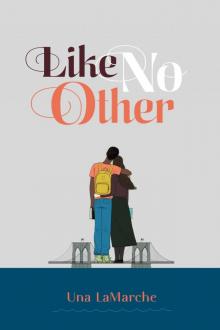 Like No Other
Like No Other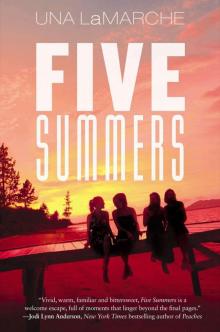 Five Summers
Five Summers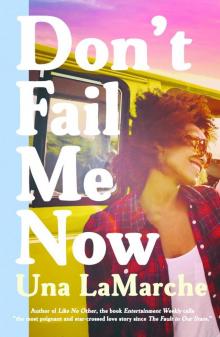 Don't Fail Me Now
Don't Fail Me Now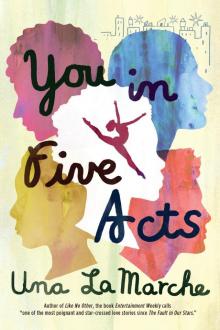 You in Five Acts
You in Five Acts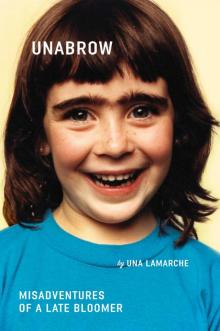 Unabrow
Unabrow